May 20, 2022 · Jeremy Razook
Reach the Right Travelers: Facebook Targeting for Hotels
According to Hootsuite, organic reach hovers around 5% and Facebook is continually evolving its algorithm to “provide a better user experience”, which often comes at a cost for businesses. We know that hotel social media marketing is an important part of any well-rounded hotel marketing presence, but how can we make the most of our efforts?
Though well-executed organic campaigns can be effective, the simple truth is that you will get the biggest bang for your buck by pairing important organic campaigns with paid advertising. As the world’s largest and most engaged social media network, Facebook provides a wealth of opportunities for advertisers. Not only does the highly visual nature of the platform lend itself nicely to showcasing experiences, but Facebook also offers a travel-specific ad format (Facebook Travel Ads).
Facebook offers several advertising ad formats that can be effective for hotels, though the ad format you choose won’t matter if you do not target the right audience. Honing in on a highly specific audience that is properly aligned with your overall campaign goal can make or break your Facebook ad performance. And despite Apple’s 2021 privacy update, there are still plenty of ways marketers can reach the right audience on Facebook post iOS 14.5.
But before selecting the audience you want to target, we recommend defining a goal first.
Defining Your Facebook Advertising Goal
Are you trying to generate awareness about a new on-property amenity or a new special/package? Are you trying to generate new leads? Are you trying to increase sales during a promotion? Defining your goal will help you best decide which audience (and ad format) will best help you achieve your goal.
Keep in mind sales and revenue are not the only goals of a campaign. While social media can work to generate real dollars for your hotel, social media is far more effective at building relationships with past, present, and future guests. It’s also an effective platform for reaching new people and generating brand uplift.
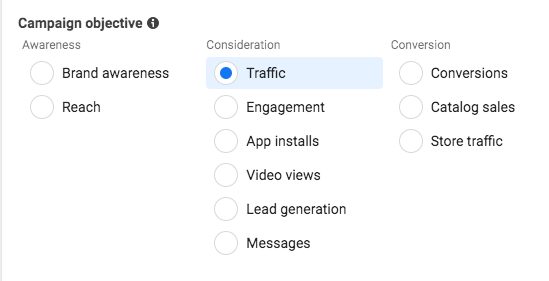
Simply put, social media is just one touchpoint, albeit an important touchpoint, throughout the customer shopping journey. Your primary goal should be to be helpful and relevant at all times – versus being a giant sales billboard. Your fans won’t like your content, they won’t engage, and down goes any organic reach in an endless spiral of failure.
Now that we have defined our goal, let’s start exploring the vast array of targeting options available through Facebook and start defining a few guest personas. Keep in mind that while we will discuss each targeting option on its own, targeting is far more effective when multiple elements are combined to define a specific audience.
Let’s start with the basics.
Geographic Targeting
Geographic targeting allows you to target users in a specific location. Despite the initial obviousness of this targeting option, there are a few nuances that can come in handy for hotels.
Facebook’s location targeting option features a drop-down menu that allows you to select different “location” definitions. Advertisers can choose to target “everyone” in a location, people that actually “live” in a location, people that were “recently in” a location, or people that are “traveling” in a location. These distinctions can be very important, depending on the goal of your campaign.
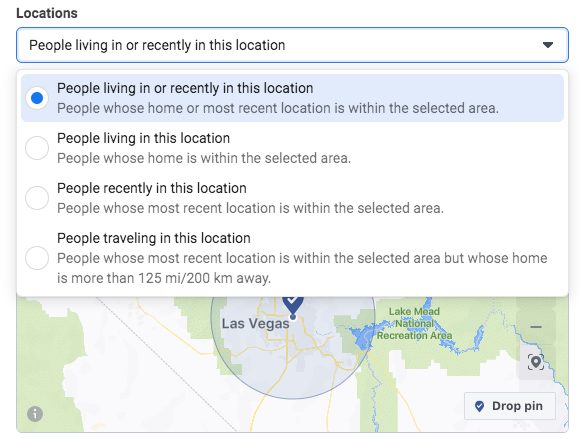
Location targets include continents, countries, cities, and zip codes. You can also drop a pin and select a radius up to 50 miles around your pin drop.
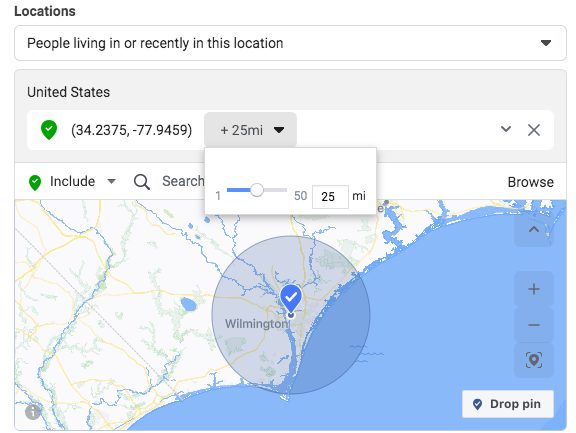
Let’s say you are a beach destination and the season is winding down. To gain exposure amongst fresh faces, you might choose to run a campaign featuring a slideshow of this year’s hotel guests having a great time at your property and enjoying all of your unique on-site amenities. You can then target people who were recently at your destination (while also excluding current page fans) to help them remember their trip and introduce your property. Similarly, targeting people that only live in your location can help promote a “local only” deal or build a loyal local following for on-site dining or service you may offer.
It is important to note that, while the default option here is to “include” users in a specific location, you may also choose to “exclude” users in a specific location as well.
Demographic Targeting
The next set of targeting parameters presented by Facebook includes specific demographic targeting options. Outside of the basic “age” and “gender” selections, Facebook lets advertisers hone in on users based on a variety of other demographic parameters, including education, financial, life events, parents, relationship, work, and more.
There are also more specific targeting options within these primary demographic categories. For example, the “parents” category breaks down into specific categories based on how old the child is (parents with preschoolers 03-05 years).
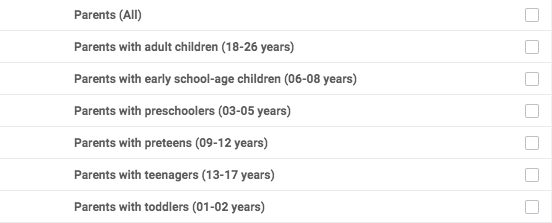
Several of these demographic categories can be beneficial for hotels. For example, the “parents” category can be great for properties that are family-friendly and lets you promote specific amenities that are attractive to certain age groups; babies might love the splash pool while teens will love your waterslides. The “financial” category can help hotels reach personas based on income or net worth. Are you a high-end property? Hone in on users with a higher income (ex: household income top 10% of U.S. zip codes). Are you a romantic property? Target users by their anniversary or who are “newly engaged”.
The options are only limited by your creativity!
Interest Targeting
Similar to demographic targeting, interest-based targeting allows advertisers to hone in on platform users with specific interests. Interest categories include business, entertainment, family and relationships, fitness and wellness, food and drink, and much more. And, like demographic targeting, these categories can also be driven down into subcategories. For example, the “hobbies and activities” category can be narrowed down to specific “travel” related categories.
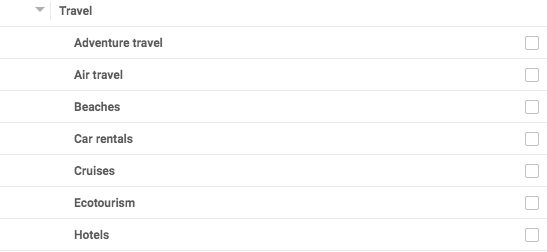
There are several obvious, and a few not-so-obvious, applications here. Travel, of course, can help hotels better define the traveler profile. Options here include important location-based travel elements, like “beaches” or “mountains”, and generic categories, like “vacations” or “adventure travel”. Does your hotel offer a unique emphasis on health and wellness? If so, interest categories like “yoga”, “running” and “physical exercise” might be highly relevant. Does your property offer eclectic or exciting on-site dining or beverage options? If so, specific food and beverage targeting can help you reach hip, happening foodies.
Just like demographic targeting, interest targeting is only limited by your imagination.
Behavioral targeting
Facebook’s behavioral targeting options let you select from audiences pre-defined by consumer behavior. For example, the “travel” category can be narrowed down to “frequent travelers”. If you’re interested in targeting a group of people that are more likely to travel, this could be a good option for you. Outside of the “travel” category, many of Facebook’s behavioral targeting options may not make much sense for a hotel. Though, the “interested in upcoming events” audience may be a good option if you need to promote an on-property event.
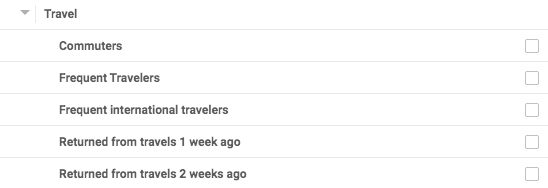
Now that you’ve mastered the basics, let’s move on to more advanced Facebook targeting for hotels options.
Trip Consideration
Available only to travel advertisers, Trip Consideration prioritizes ad delivery to people in your audience that are likely to book a trip. It’s a feature that can be beneficial for sales-focused campaigns. The great thing about Trip Consideration is that you can combine it with your existing audience targeting. Before you can use Trip Consideration, you must have a Meta Pixel (formerly Facebook Pixel) implemented on your website. If available to you, you can toggle Trip Consideration on or off at the ad set level of your Facebook campaign.
Lookalike Audiences
As the name suggests, “lookalike” audiences are audiences that “look like” your selected audience. Though Facebook’s algorithm for finding and defining these audiences is proprietary and under wraps, Facebook does allow you to provide a source for the “lookalikes”. Source options can be pulled from your Facebook page, a page on your website (pulled via the Meta Pixel – more on that later), or your mobile app. You can also specify the location of the audience on a country or region-based level.
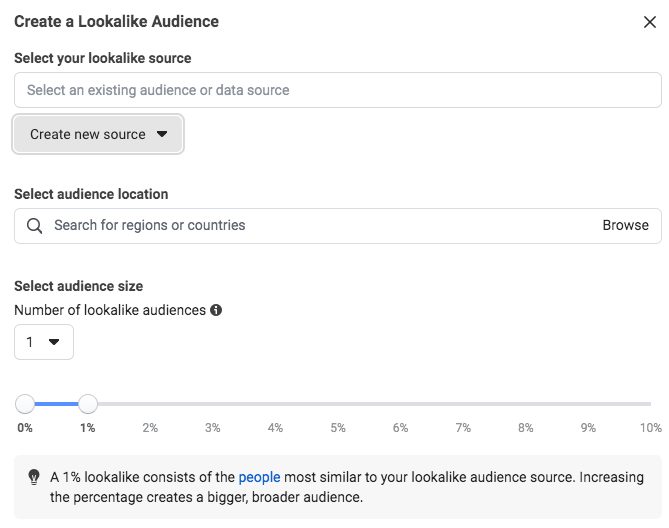
Once source and location selections are made, Facebook then allows you to define the size and relevance of your list based on the total percentage of the population. We typically recommend staying within 1% of the audience size to reach the most relevant “lookalike” sources.
You can build your lookalike audience directly in your campaign build-out in Ads Manager or via the Audiences section in your Facebook Business Manager. Learn more about Facebook Lookalike Audiences.
Custom Audiences
In a broad sense, custom audiences are groups of users that are highly unique to your particular business page. As the name suggests, the highly custom nature of these user segments can make them highly effective.
Much like lookalike audiences, custom audiences will need to be set up in advance as the data will populate over time.
There are several different types of custom audiences that can be defined. To get started, navigate to the Audiences section of your Facebook Business Manager, select Create Audience and choose Custom Audience. You can also create a custom audience during your campaign build-out in Ads Manager.
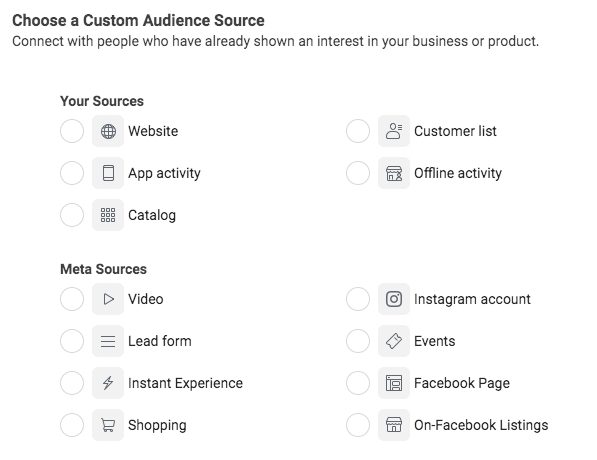
The above menu showcases the audience options available. Segments can be created via a “customer file” (ex: email list upload), website traffic (via the Meta Pixel), app activity, offline activity, and engagement.
Custom audiences can be a great way to re-target or re-engage a warm audience.
Useful custom targeting options for hotels include:
- Build a custom audience based on website visitors and invite them to “like” your page
- Build a custom audience on previous guests during a specific time (ex: last summer) and drive website traffic to a relevant landing page (ex: summer specials)
- Build a custom audience based on video views of your most popular Facebook videos to get people to take action
- Build a custom audience based on your most engaged page fans to convert those raving fans into leads
Custom audiences also include audiences that were once considered Connections targeting, which are no longer be available to marketers as of mid-2022. These audiences include people who currently like or follow your page and people who responded to an event on your page.
Each custom audience requires specific fields or actions to be defined, but the process is very simple and Facebook guides you through the process.
Learn more about Facebook Custom Audiences.
You can also choose to exclude specific audiences from advertising via this feature.
Using The Meta Pixel Post iOS 14.5
The Meta Pixel is a proprietary snippet of code that is placed on various places throughout a website to track either standard or custom “events” – aka actions that take place on your website. Implementing the pixel can help your hotel not only better reach potential and previous guests through smarter targeting, but will also help you better measure the impact of your marketing efforts through conversion tracking.
However, after the Apple iOS 14.5 rollout in spring 2021, Facebook has made quite a few regulatory conditions in order to use the pixel’s tracking capabilities to their fullest. The new rollout has led to smaller website custom audiences and has caused hotels to rethink their Facebook advertising strategies, from goals to the audiences they target. Despite the tracking capability updates, we’ve still seen success running campaigns targeting custom audiences built from the Meta Pixel. Just know that when setting up your pixel, there will be a few more steps involved now than there were previously, including domain verification and event prioritization.
Mobile Device & OS Targeting
This option may not make a ton of sense for the typical hotel campaign, but it’s available if you prefer to use it. If you’re new to Facebook Ads, it may be a good option for you to feel out how certain users on mobile devices engage with your ads. And now that Apple iOS 14.5 privacy updates have arrived, it may make sense to test operating devices against each other to see which operating systems gain more engagement, clicks, purchases, etc. That way, you can optimize your budget toward a specific operating system.
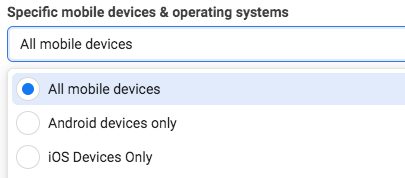
Identifying the right target audience
If you’re uncertain where to start with your ad targeting, Facebook’s Insights report can help you identify the people that engage most with your Facebook business page. Facebook Insights provides gender, age, and location metrics to help you identify your ideal customer.
You can even estimate audience size thanks to Facebook Insights’ filtering feature. For example, if you’re a hotel in Panama City Beach with a customer base in Alabama and Georgia, you can plug in Georgia and Alabama as your target locations and add Panama City Beach as an interest. Based on these selections, the potential audience size is well over one million people, with most people being women ages 25 to 54 years old that live in Birmingham, Montgomery, and Mobile, Alabama, and Atlanta and Columbus, Georgia. You now have what you need to get very granular in your targeting.
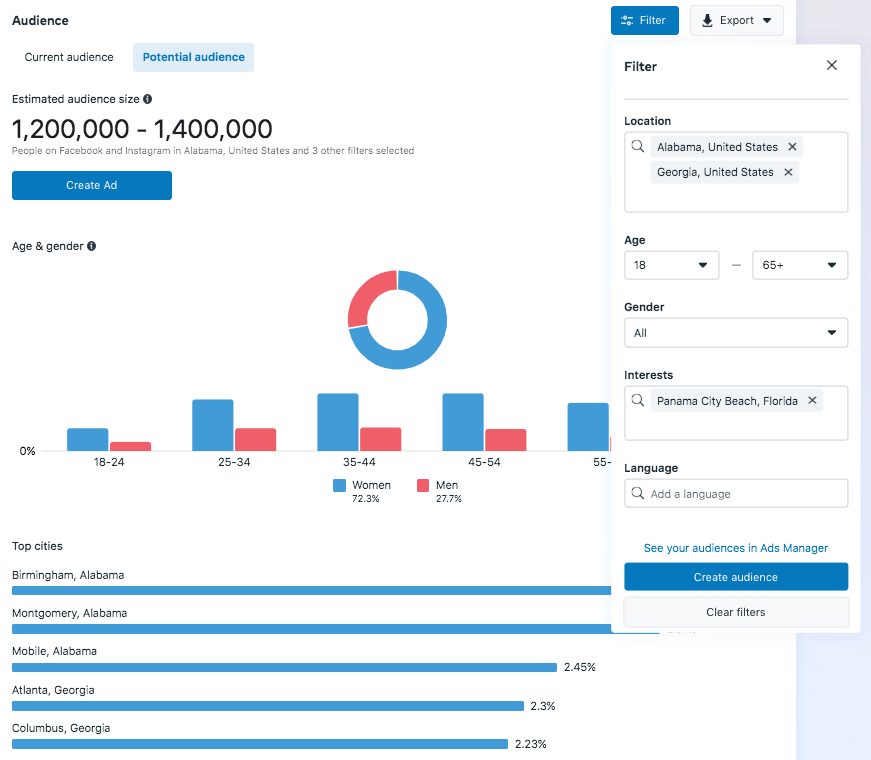
You can also use Google Analytics to identify the demographics and locations that are most likely to convert.
Targeting Best Practices
The most successful ad campaigns will closely match their goal with the intended audience and craft ad copy and creative that brings the two together. Here are a few best practices to keep in mind when defining your Facebook campaign target audience:
- Clearly define your campaign goal before running any ads
- Build out your target customer persona and combine multiple targeting elements to reach the ideal traveler
- Understand what stage of the travel shopping funnel you are addressing and match your audience accordingly
- Use custom audiences to discover and reach highly qualified targets
- Use appropriate reporting to match your campaign goal. If your goal is to increase brand reach, use demand generation reporting to determine success. If your goal is to earn more website visits, use landing page view reporting, and so on.
Read more about Facebook targeting best practices.
Need Help Getting Your Facebook Marketing Campaign Off The Ground?
Contact TravelBoom Marketing for a complimentary digital marketing evaluation today!